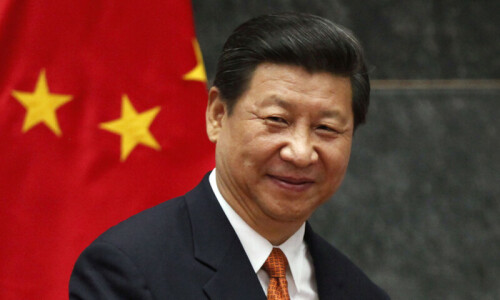KARACHI: The influx of cheap imports from China has left an adverse impact on the local industry as small and medium-sized enterprises (SMEs) are losing ground to products from Asia’s largest economy, according to a recent report published on the website of the State Bank of Pakistan (SBP).
Written by two SBP officials, the report titled “Dynamics of Pakistan’s Trade Balance with China” says the bilateral trade balance remains skewed towards China. Pakistan’s volume of bilateral trade expanded and reached $13.8 billion in 2015-16, up from $2.2bn in 2004-05. However, Pakistan’s exports to China increased from $0.4bn in 2004-05 to $1.7bn in 2015-16.
“Imports from China grew exponentially – increased from $1.8bn in 2004-05 to $13.9bn in July-May 2016-17,” said the report.
As per the Tariff Reduction Modality of China, some of the Pakistani products having relatively greater export potential were facing high tariff rates and receiving no concession on China’s offer list, said the report.
For instance, Pakistani dried fruits had a tariff rate of around 25 per cent, semi-milled or wholly milled rice/broken rice 65pc, footwear with wood base/metal toe-cap 24pc and men’s garments of cotton 16pc, it said.
Exports to Beijing are heavily concentrated in cotton, rice
In contrast, items in which Pakistan lacks competitive advantage, such as telephone sets, digital cameras, electrical machines and toys, were included in the tariff elimination list of China.
The report said Pakistan’s margin of preference eroded due to China’s free trade agreements (FTAs) with other countries, especially with members of the Association of Southeast Asian Nations.
It suggested that Pakistan should seek the same level of tariff concessions on its exports to China as enjoyed by its competitors from East Asian countries. “This may provide our exports an equal opportunity to compete with the competitors’ products in Chinese markets,” said the report.
Due to cheap imports from China, local manufacturing of ceramics, electric machinery and equipment, chipboard, plywood, bicycles and a number of other small-scale industries have been affected.
“Although adequate data is not available in support of the argument, the influx of imported consumer goods and non-availability of their local substitutes present enough evidence that local SMEs are losing ground in the domestic market,” it said.
The report said Pakistan’s potential export areas remain limited because China outpaced it in almost all of its major producing sectors. China now occupies the largest share in Pakistan’s total imports (29pc) and is followed by the United Arab Emirates (13pc). These imports mainly include electrical equipment, high-tech machinery, nuclear reactors, iron and steel, organic chemicals and manmade filaments. In fact, more than half of Pakistan’s imports of electrical equipment and machinery are from China.
After the FTA in 2007, the top import from China – electrical, electronic equipment – increased by 68pc of all imports of that product from the rest of the world.
Pakistan’s exports to China are heavily concentrated in cotton and rice, accounting for 75pc of the country’s total exports to the neighbouring country, said the report. Cotton exports to China increased from $358 million in 2006 to $968m in 2016.
Published in Dawn, October 8th, 2017














































